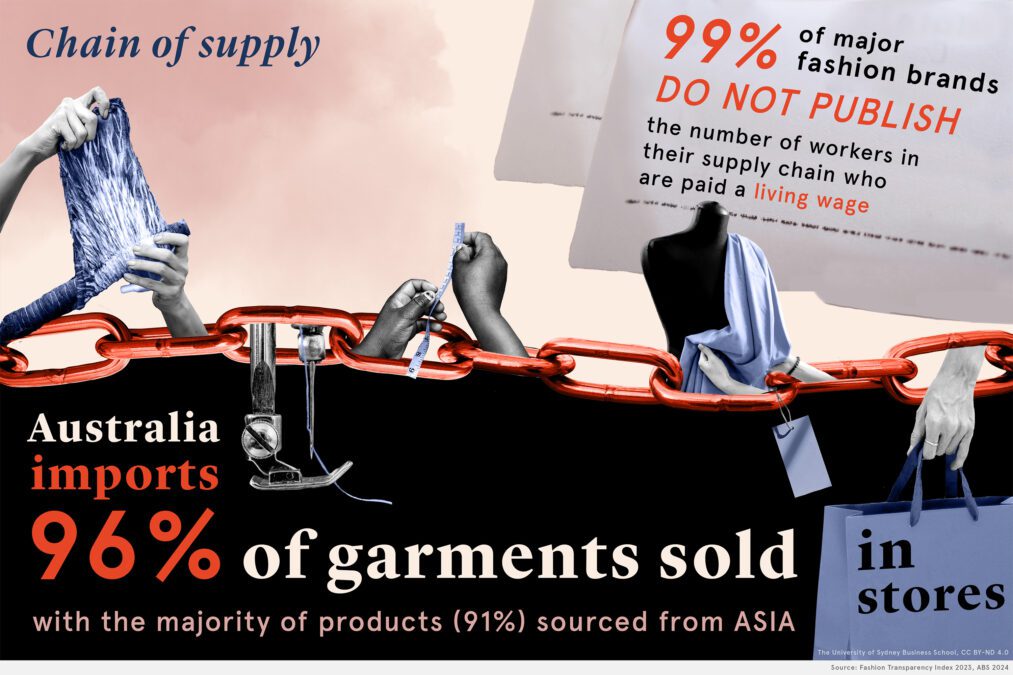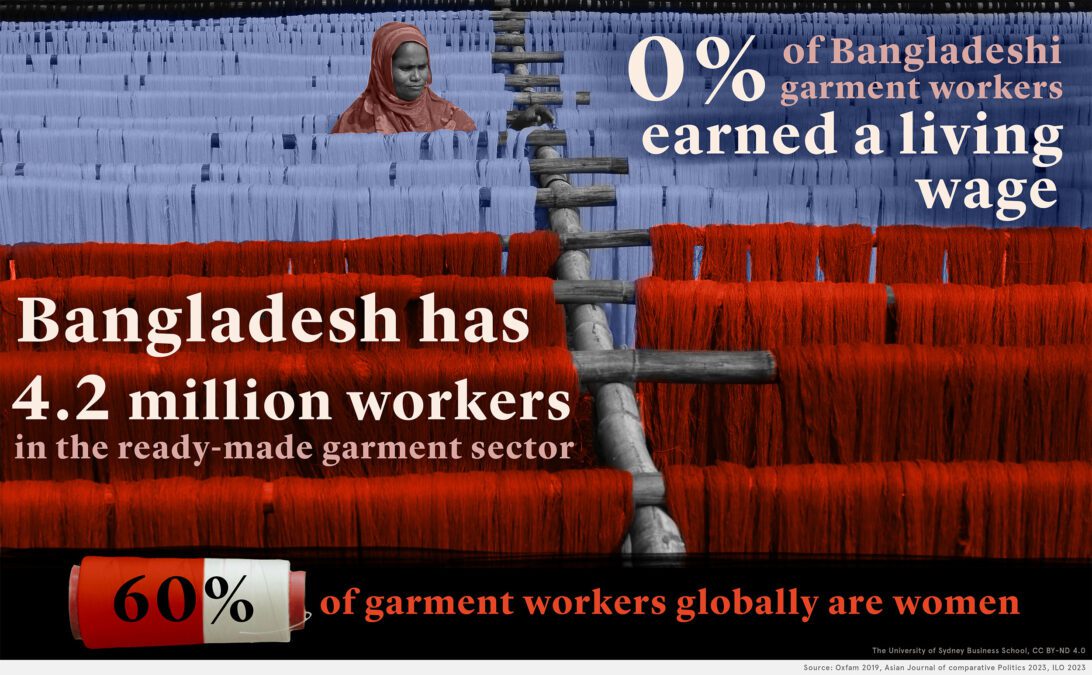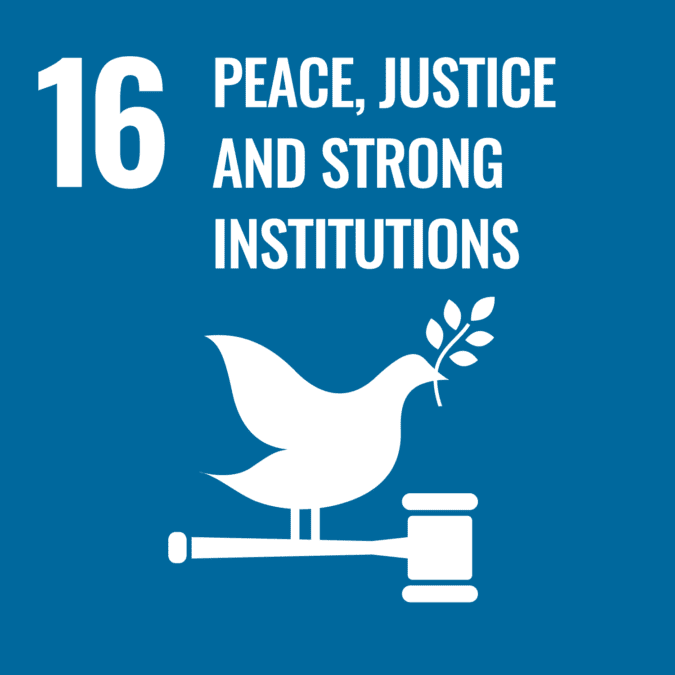
SDGs by 2030 – are we on track?
Business is global and so are human rights
It took the deaths of 1,133 workers in the collapse of a factory in Bangladesh to force international action to improve workplace safety and labour conditions in the globalised garment industry.

The Rana Plaza catastrophe starkly highlights the relevance of SDG 16 in the context of corporate accountability and justice. The building housed five garment factories supplying fashion brands around the world when it collapsed in April 2013. Some of the dead included workers’ children in an onsite nursery. More than 2,000 workers were injured, most of them women. The tragedy exposed shocking deficiencies in local building standards and regulatory oversight.
The collapse marked an awakening to the conditions within the global fashion industry with production facilities and supply chains in diverse businesses networked across many countries.
People who shopped at retailers like Zara, Walmart, Primark, Mango, Benetton, whose labels were found in the rubble, were forced to recognise the conditions that enabled the production of low-cost clothing.
The human induced disaster provoked international action: global union federations and Bangladeshi trade unions established the Bangladeshi Accord which had oversight from the International Labour Organization and several Non-Governmental Organisations (NGOs). This established a system of international regulations requiring global companies sourcing within Bangladesh to comply with fundamental health and safety standards.
SDG 16 calls for effective, accountable, and transparent and inclusive institutions at all levels, providing access to justice for all.
My research focuses on how to build effective institutions to address the “governance gaps” that present barriers to decent work.
These governance gaps are widest in global supply chains. Advanced technologies and reduced transportation costs have made it easier for large commercially powerful firms, such as global fashion brands and retailers, to outsource and offshore activities to firms located in countries where labour costs are much lower and worker protections are weaker. The Rana Plaza disaster is one example of the tragic consequences when global firms exploit governance gaps.
Addressing this problem is challenging because the institutions tasked with governing working conditions are primarily national in scope. Governments have very limited ability to make accountable firms whose activities erode labour standards in other countries. The United Kingdom, France, Australia and California have recently adopted laws requiring firms disclose efforts to address modern slavery within their global supply chains, but these laws lack robust enforcement mechanisms and only apply to very large firms.

Various voluntary initiatives ask global firms use their power responsibly to improve, rather than degrade, working conditions within their supply chains. For example, the UN Global Compact, the UN Guiding Principles on Business and Human Rights and the OECD Guidelines for Multinational Enterprises call upon global firms to use their position to encourage entities in their global supply chains adopt international labour standards.
These initiatives are designed to promote more responsible and sustainable business practices and are therefore welcome. However, because they are voluntary compacts with ‘soft law’ mechanisms, they do not police or enforce business behaviour. While signature firms are encouraged to support internationally recognised human rights, these agreements rarely cover more substantive issues such as fair wages, decent working conditions, job security and worker representation, which are necessary to achieve decent work.
Robust institutions are essential to address labour standards and governance gaps in global supply chains. The legally binding Bangladesh Accord is a vital example of this. It ensures signatory firms are accountable for the conditions of workers in their suppliers’ factories.
Although the Bangladesh Accord’s coverage was initially limited to the garment sector of Bangladesh, a renewed version, known as the International Accord for Health and Safety in the Textile and Garment Industry, came into effect in 2021 and was expanded to the Pakistan garment sector in 2023.
By providing accountability mechanisms to firms across supply chains and involving worker organisations, industry, governments and international organisations in this process, the Accord is model that could be replicated elsewhere to improve the governance of labour standards in global supply chains.

Sustainable Development Goal (SDG) targets addressed:
Target 16.6 Develop effective, accountable and transparent institutions at all levels
Target 16.8 Broaden and strengthen the participation of developing countries in the institutions of global governance
Target 16.10 Ensure public access to information and protect fundamental freedoms, in accordance with national legislation and international agreements
Resources
You are the Minister for Labour in a medium-sized high-income country where many multinational companies are headquartered. Some of these multinational companies have been found to be engaging contractors in lower-income countries with exploitative labour practices, which has led to consumer boycotts and significant criticism from unions, NGOs, investors and the media. The Minister for Trade has tasked you with developing a strategy to ensure that multinational companies headquartered in your country are held accountable for labour standards in the global supply chains.
- What factors would you consider in developing this strategy?
- Is it possible for national governments to hold companies responsible for the behaviour of businesses within their global supply chains?
- What are the benefits and risks that you need to consider?
- Which stakeholders would you need to collaborate with to ensure that the strategy is successful?
Books
- Colfer, B., Harney, B., McLaughlin, C. & Wright, C.F. (eds) (2023) Protecting the Future of Work: New Institutional Arrangements for Safeguarding Labour Standards. Bingley: Emerald Publisher Limited.
- Newsome, K., Taylor, P., Bair, J. and Rainnie, A. (2017). Putting Labour in its Place: Labour Process Analysis and Global Value Chains. London: Bloomsbury
- Nolan, J. and Boersma, M. (2019) Addressing Modern Slavery. Sydney: UNSW Press
- Reinecke, J. and Donaghey, J. (2023) Stitching Governance for Labour Rights: Towards Transnational Industrial Democracy? Cambridge: Cambridge University Press
- Ruggie, J.G. (2013) Just Business: Multinational Corporations and Human Rights. New York: W.W. Norton & Company
- Coe, N.M. and Yeung, H.W.C. (2015). Global production networks: Theorizing economic development in an interconnected world. Oxford University Press.
Articles
- Anner, M., 2020. Squeezing workers’ rights in global supply chains: Purchasing practices in the Bangladesh garment export sector in comparative perspective. Review of international political economy, 27(2): 320-347
- Donaghey, J., Reinecke, J., Niforou, C. and Lawson, B. (2014). From employment relations to consumption relations: Balancing labor governance in global supply chains. Human Resource Management, 53(2): 229-252
- LeBaron, G. (2021) The role of supply chains in the global business of forced labour. Journal of Supply Chain Management, 57(2): 29-42
- Schuessler, E., Frenkel, S. and Wright, C.F. (2019) Governance of labor standards in Australian and German garment supply chains: The impact of Rana Plaza. ILR Review, 72(3): 552-579
- Wright, C.F. and Kaine, S. (2015) Supply chains, production networks and the employment relationship. Journal of Industrial Relations, 57(4): 483-501
- Abu Faisal Md Khaled et al. Bangladesh’s ready-made garments sector rebound: Revisiting gendered labor precarity and dependency. Asian Journal of Comparative Politics, Vol 9, Issue 2, May 8, 2023
Podcast
Websites
- Can Global Brands Create Just Supply Chains?
- International Accord for Health and Safety in the Garment and Textile Industry
- UN Guiding Principles on Business and Human Rights
- Fashion Transparency Index 2023
- Australian Bureau of Statistics: Australian National Accounts: Input-Output Tables
- OXFAM Australia: Made in poverty
- International Labour Organization: How to achieve gender equality in global garment supply chains
Chris F Wright is an Associate Professor in the Discipline of Work and Organisational Studies. His research examines the institutional drivers of and barriers to the attainment of decent work.
Share
We believe in open and honest access to knowledge. We use a Creative Commons Attribution NoDerivatives licence for our articles and podcasts, so you can republish them for free, online or in print.



